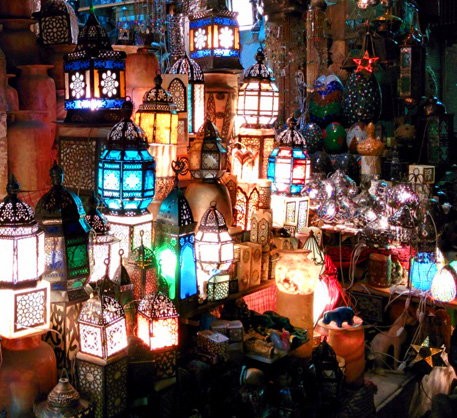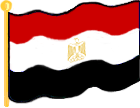وحوي یا وحوي
Cairo is known as being a magical place during Ramadan season when it's lit up with colorful lanterns.
Young Muslim children in Egypt sing this song for Ramadan and walk down the streets swinging their own little lanterns.
"After sunset (when people are no longer observing their Ramadan fast that takes place during the day), streets and squares all over the Muslim world are thronged with people out buying food after the long day's fast, or visiting friends, or preparing for sahur, the last meal of the night, which will be taken before dawn. It is then that young Cairenes, allowed to stay up late because of Ramadan, traditionally gather in groups of three or four to go out among the crowds, swinging their glowing lanterns and chanting their ancient song of Ramadan - just as children in other lands go caroling - hoping to receive in return a few nuts or sweets for their vocal efforts." -John Feeney, Aramco World
Note: The song's pronunciation can be found in the Song Notes.

وحوي یا وحوي
Wahawee ya wahawee
Ramadan Song
Ramadan Song
(Arabic)
(English)
وحوي یا وحوي
إیاحا
رحت یا شعبان
جیت یا رمضان
إیاحا
بنت السلطان
لابسه القفطان
الله الغفار
أعطینا الهدیه
الله الغفار
Wahawee ya wahawee (1)
Iyaha (2)
Sha'aban (3) you are gone
Ramadan (4) you came
Iyaha
Hey! Daughter of the Sultan (5)
You wear a caftan (6)
God is the forgiver
Give us the gift
God is the forgiver.
Notes
(1) Some believe that "Wahawee" is a word from the Ancient Egyptian meaning "go" or "gone". Though this might be folk etymology. Nowadays, it's like singing "lalala".
(2) Iyaha is also like "lalala". It's believed that the word "Iyaha" is related to the moon in Ancient Egyptian and Coptic, the later form of the language.
(3) Sha'ban is the eighth month of the Islamic calendar. It's the month of "separation", so called because the pagan Arabs used to disperse in search of water.
(4) Ramadan is the ninth month of the Islamic calendar, and is observed by Muslims worldwide as a month of fasting (Sawm) to commemorate the first revelation of the Quran to Muhammad according to Islamic belief.
(5) A sultan is a leader of a Muslim country. The title carries religious significance.
(6) A kaftan or caftan is a variant of the robe or tunic and has been worn by several cultures around the world for thousands of years. In the Arabic and Islamic world women used to wear caftans. Nowadays wearing a caftan as a cultural habit is typical during the month of Ramadan among women in Arabic countries.
Pronunciation:
Wahawee ya wahawee
Iyaha
Roht ya Sha'aban
Geet ya Ramadan
Iyaha
Bent el sultan
Labsa el qoftan
Allah al ghaffar
Attina el hadiyah
Allah al ghaffar
Here's a more technical version of the pronunciation with notes on specific sounds:
Wa7awi ya wa7awi
Iya7a
Ro7t ya sha3ban
Geet ya ramaDan
Iya7a
Bent el solTan
Labsa el qofTan
Allah al ghaffar
3Tina el hadiyah
Allah al ghaffar
7 = strong "h" pronounced lower in the throat –imagine you've swallowed some very hot pepper
3 = a sort of "ah" sound pronounced very low in the throat
D ="dark d", pronounced raising the roof of your mouth
T = "dark t", pronounced raising the roof of your mouth
q = "dark k", pronounced raising the roof of your mouth
gh = a gargling sound
Comments
"Some believe that the children's lantern song comes all the way from Pharaonic times, like the ancient Egyptian song called O-Faleh in the Pharaonic tongue and al-Bahr Sa'id in Arabic (meaning 'The River Has Risen'). In the days before the Aswan Dam was built, that song was sung by groups out in small boats on the night the Nile reached the peak of its annual flood. Certainly, the lantern song is very old, and very Egyptian." -John Feeney, Aramco World
Read more about "Wahawi ya Wahawi" here.
Thanks and Acknowledgements
Many thanks to Emmanuel Aghazarm and to Fatimah Baji for helping with the Arabic text, the translation, transliteration and song notes.
























